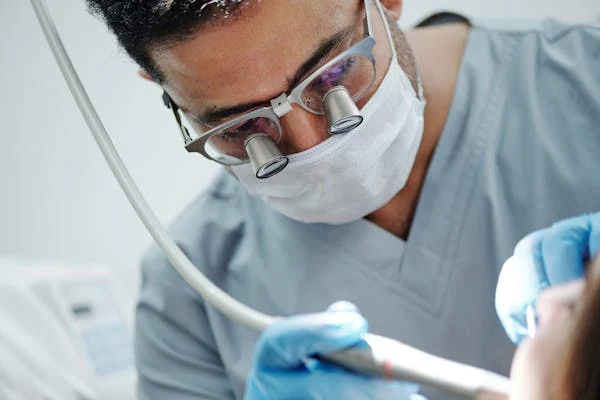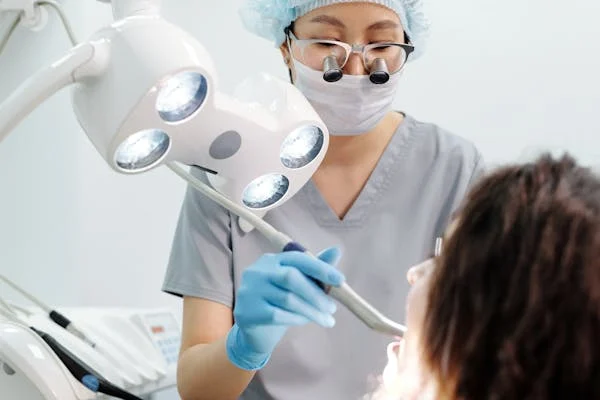Precision is the cornerstone of any successful surgery. Surgeons rely not only on their skills and experience but also on the tools they use to ensure accuracy, minimize errors, and improve patient outcomes. Among these critical tools are surgical loupes (dental loupes with light), which have become an indispensable asset in modern medical practices. The importance of loupes in surgery cannot be overstated, as they enable surgeons to “see smaller” and thus “do better.” This article delves into the significance of loupes in surgical practice and why their adoption continues to grow.
What Are Surgical Loupes?

Surgical loupes are magnifying devices worn by surgeons, typically as part of their eyewear. They provide enhanced visual clarity by magnifying the surgical field, enabling the surgeon to see finer details that would otherwise be difficult or impossible to detect with the naked eye. Surgical loupes are available in different magnification levels, typically ranging from 2.5x to 6.0x, depending on the type of surgery being performed.
Beyond magnification, some loupes also incorporate advanced features such as adjustable focus, customizable frame sizes, and integrated lighting. The use of loupes in surgery is not limited to a particular specialty; they are utilized in a wide array of medical fields, including dental surgery, plastic surgery, neurosurgery, and more.
The Importance of Loupes in Surgery
- Enhanced Precision
One of the primary reasons loupes are so valuable in surgery is the precision they afford. Surgeons often work on extremely small structures within the human body, such as blood vessels, nerves, or minute layers of tissue. Without the aid of magnification, distinguishing between these delicate structures can be challenging, potentially leading to errors.
Loupes in surgery provide surgeons with the necessary magnification to clearly differentiate between tissues, improving their ability to perform more accurate incisions and sutures. This precision is vital for reducing the risk of damage to surrounding areas and ensuring the best possible surgical outcomes.
- Better Ergonomics
Another crucial benefit of using loupes is their positive impact on surgeon ergonomics. Without magnification, surgeons often need to bend or strain their necks to achieve a close view of the operating site. Over time, this unnatural posture can lead to fatigue, discomfort, and even long-term musculoskeletal issues, including back and neck pain.
By using surgical loupes, surgeons can maintain a more natural, upright posture while still gaining a detailed view of the surgical field. This reduces the strain on their bodies, allowing them to operate for longer periods without experiencing the physical toll associated with poor ergonomics.
- Improved Focus and Concentration
A focused surgical field is paramount in any procedure. The ability to hone in on a specific area of interest without distractions significantly enhances a surgeon’s concentration. Loupes in surgery help narrow the surgeon’s field of vision, effectively blocking out extraneous visual stimuli. This can improve the surgeon’s focus, reducing the likelihood of errors caused by distractions or lapses in attention.
The clarity and magnification provided by loupes ensure that every movement is deliberate and precise, which is especially important during complex or lengthy surgeries.
- Reducing Surgical Time and Improving Efficiency
Precision is not just about avoiding mistakes; it also correlates with efficiency. When surgeons can see smaller details more clearly, they spend less time correcting errors or re-evaluating their work. This can lead to shorter surgery times and, consequently, reduced anesthesia exposure for patients, which is always a desirable outcome.
Moreover, reducing surgical time helps optimize the use of operating rooms and resources, making it possible to perform more procedures within the same timeframe without sacrificing quality. The importance of loupes in driving surgical efficiency is thus clear.
- Better Patient Outcomes
At the end of the day, all the benefits of loupes—from improved precision to better ergonomics—translate into better patient outcomes. Fewer mistakes mean fewer complications, reduced risk of infection, and faster recovery times. Additionally, the improved ergonomics and reduced fatigue on the part of the surgeon ensure that they are performing at their best throughout the entire procedure, no matter how long it takes.
Types of Loupes and Their Use Cases
Surgeons can choose from various types of loupes, depending on their specialty and the specific demands of their procedures:
- Through-the-Lens (TTL) Loupes: These are designed with the magnification lens embedded directly into the eyeglass frame, offering a fixed focal length and consistent field of view. They are ideal for procedures where the surgeon doesn’t need to adjust the focal length often.
- Flip-up Loupes: These offer more versatility, as the magnification lens can be flipped up when not in use. Flip-up loupes are ideal for surgeons who perform a variety of procedures requiring different levels of magnification or those who want flexibility without removing their eyewear.
- Customizable Loupes with Lights: In some cases, integrating lights with loupes can enhance visibility further, especially when operating in dimly lit areas of the body or for precision-driven procedures. Dental loupes with light attachments, for instance, are popular among oral surgeons and dentists for optimizing visibility inside the oral cavity.
How to Choose the Right Loupes
When selecting surgical loupes, several factors should be considered:
- Magnification Power: Higher magnification is not always better; the right level depends on the type of surgery being performed. For delicate microsurgeries, higher magnifications (4.0x and above) may be required, while general surgeries might only need 2.5x to 3.5x.
- Field of View: The field of view should be wide enough to allow the surgeon to see the necessary area without moving their head too much. This reduces strain and improves efficiency during surgery.
- Comfort and Fit: Since loupes are worn for extended periods, they should be lightweight and comfortable, fitting securely on the surgeon’s head. Customizable loupes that cater to individual preferences in frame design and lens position are often the most comfortable options.
- Lighting Integration: For surgeons working in low-light conditions, choosing loupes that integrate lighting can be advantageous. The best dental headlights or other specialized lights enhance clarity, ensuring the surgeon sees everything they need to during the procedure.
Invest in Quality Loupes for Better Surgical Outcomes
In the fast-evolving world of surgery, precision, focus, and efficiency are more important than ever. The importance of loupes in this context is clear: they enhance surgical precision, improve ergonomics, reduce strain, and lead to better patient outcomes.


